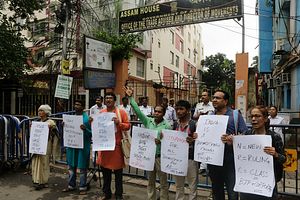The ruling Bharatiya Janata Party in India has expressed serious concern over the National Register of Citizens (NRC) in Assam just days before the exercise draws to a close on August 31, five years after it was launched in the border state.
In a series of statements in the last couple of weeks, BJP leaders alleged that a large number of foreigners have been included in the register through fraudulent means. Party president of the Assam unit Ranjit Das has pinned the blame on a section of officials engaged in the exercise who allegedly accepted fake documents from foreigners for enrolling their names in the register.
Even before Das vented his grievances, Assam Chief Minister Sarbananda Sonowal from the same party told reporters in New Delhi on August 19 that the government might consider “legislative options” to identify foreigners who had managed to get their names in the register. He was in the capital for a meeting on the NRC with Home Minister Amit Shah.
The NRC is being updated only in Assam among all the states in India following an agreement in 2005 between the government and the All Assam Students’ Union (AASU) although the concept and demand from indigenous communities stretches back several years in the troubled state. Although the BJP has expressed dissatisfaction over the process in Assam, which is being monitored by the Supreme Court, it has said that it was keen to extend the exercise all over the country.
The party has been particularly apprehensive over the exercise in the border districts of Assam with Bangladesh. The BJP had made a plea for a 20 percent random verification of the list before the Supreme Court, which was not accepted.
The BJP is no less concerned over the exclusion of a large number of Bangladeshi Hindus from the NRC, a group it considers as a vote bank. In its election manifesto, the party had offered assurances that it would reintroduce the controversial Citizenship (Amendment) Bill in Parliament to grant citizenship to a section of non-Muslims from these neighboring countries.
Last January, almost the entire northeastern region of the country had erupted in protest when the party made hurried efforts to pass the bill in parliament. Granting citizenship to a section of non-Muslim foreigners would nullify the NRC process since the process does not make any distinction on the basis of religion.
Incidents in the last two months in Assam indicate also that the BJP has begun the process of tabling the bill once again in parliament, but in a manner that does not provoke a violent reaction in the northeast. A senior party functionary said that “past mistakes” would not be repeated and a balance would be struck between the interests of the indigenous communities in the region and the party’s commitment to the election manifesto.
BJP’s endeavor to discredit the NRC has not gone down well with local groups in the vanguard of the movement to identify foreign nationals in Assam. Earlier, a few prominent citizens had also filed a petition in the Supreme Court against the Citizenship (Amendement) Bill with the argument that it contravenes several articles of the country’s constitution and the Foreigners’ Act 1946.
The All Assam Students’ Union (AASU) has been categorical in its support to the Supreme Court’s decision not to extend the publication of the NRC beyond August 31. Many of its functionaries have been of the view that a conspiracy has been hatched to derail the process and stall its publication. Echoing similar views was adviser of the All Assam Minority Students’ Union (AAMSU) Azizur Rahman, who had made a case for an error-free NRC at a round table discussion in Guwahati on August 25.
Supreme Court lawyer and head of the Prabrajan Virodhi Manch has even issued a stinging press release on the BJP’s policy on the NRC, which he feels is a “clear admission of failure on their part of doing nothing at the right time when it was required.” He feels that in the given circumstances, the only alternative is to ensure that resources like land, employment, and trade licenses are reserved for the indigenous communities.
Rajeev Bhattacharyya is a senior journalist in Assam, India.

































